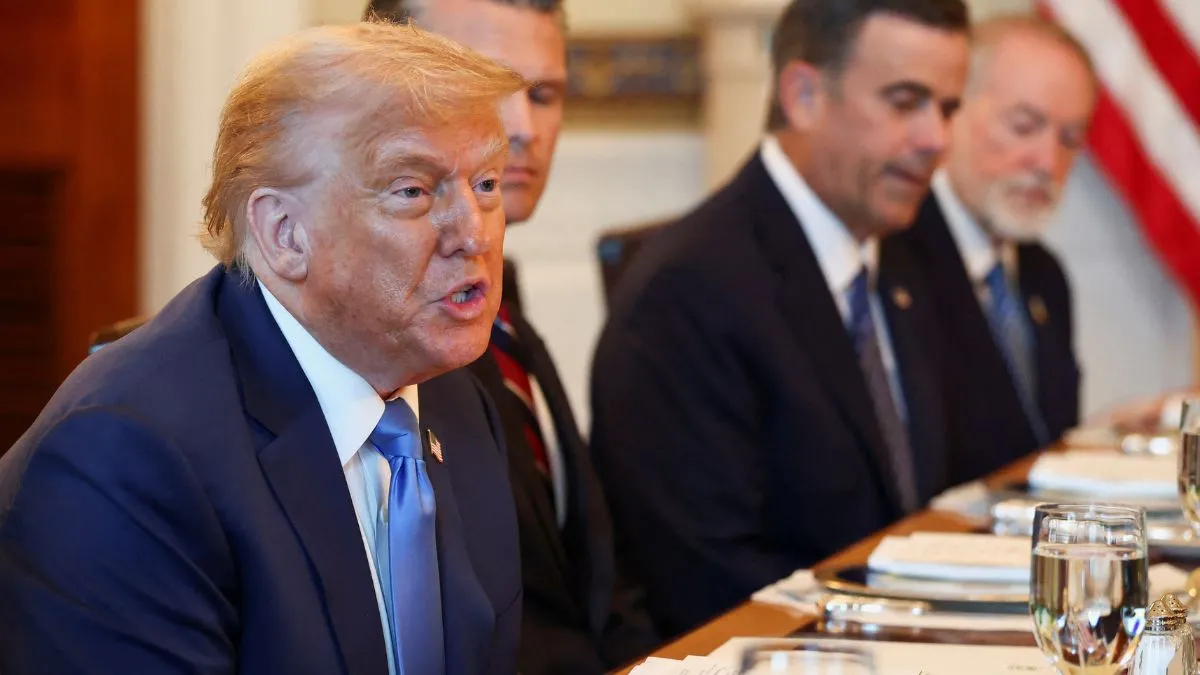- By Ajeet Kumar
- Thu, 10 Jul 2025 09:16 AM (IST)
- Source:JND
US President Donald Trump sent out tariff letters to seven smaller US trading partners on Wednesday with a pledge to announce import taxes on other countries later in the day. None of the countries targeted in the first batch of letters — the Philippines, Brunei, Moldova, Algeria, Libya, Iraq and Sri Lanka — is a major industrial rival to the United States. It's a sign that a president who has openly expressed his love for the word “tariff” is still infatuated with the idea that taxing trade will create prosperity for America.
Trump warning letter to Sri Lanka
The US has warned Sri Lanka not to retaliate against the proposed 30% tariff on its exports, cautioning that if Sri Lanka imposes similar tariffs on US goods, the US will levy an additional 30% tariff on those retaliatory tariffs. This stern warning was delivered in a letter from President Donald Trump to Sri Lanka's president, emphasizing that goods from Sri Lanka will face a 30% tariff starting August 1.
Most economic analyses say the tariffs will worsen inflationary pressures and subtract from economic growth, but Trump has used the taxes as a way to assert the diplomatic and financial power of the US on both rivals and allies.
His administration is promising that the taxes on imports will lower trade imbalances, offset some of the cost of the tax cuts he signed into law on Friday and cause factory jobs to return to the United States. Trump, during a White House meeting with African leaders talked up trade as a diplomatic tool. Trade, he said, “seems to be a foundation” for him to settle disputes between India and Pakistan, as well as Kosovo and Serbia. “You guys are going to fight, we're not going to trade,” Trump said. “And we seem to be quite successful in doing that.”
On Monday, Trump placed a 35% tariff on Serbia, one of the countries he was using as an example of how fostering trade can lead to peace. Trump said the tariff rates in his letters were based on “common sense” and trade imbalances, adding that he would be sending a letter on Wednesday or Thursday to Brazil.
Trump suggested he had not thought of penalising the countries whose leaders were meeting with him in the Oval Office — Liberia, Senegal, Gabon, Mauritania and Guinea-Bissau — as “these are friends of mine now.” Officials for the European Union, a major trade partner and source of Trump's ire on trade, said Tuesday that they are not expecting to receive a letter from Trump listing tariff rates. The Republican president started the process of announcing tariff rates on Monday by hitting two major US trading partners, Japan and South Korea, with import taxes of 25%.
Trump's fresh US tariff announcemrnt
According to Trump's letters, imports from Libya, Iraq, Algeria and Sri Lanka would be taxed at 30%, those from Moldova and Brunei at 25% and those from the Philippines at 20%. The tariffs would start August 1.
The Census Bureau reported that last year US ran a trade imbalance on goods of $1.4 billion with Algeria, $5.9 billion with Iraq, $900 million with Libya, $4.9 billion with the Philippines, $2.6 billion with Sri Lanka, $111 million with Brunei and $85 million with Moldova. The imbalance represents the difference between what the US exported to those countries and what it imported.
Taken together, the trade imbalances with those seven countries are essentially a rounding error in a US economy with a gross domestic product of $30 trillion. The letters were posted on Truth Social after the expiration of a 90-day negotiating period with a baseline levy of 10%. Trump is giving countries more time to negotiate with his Aug 1 deadline, but he has insisted there will be no extensions for the countries that receive letters.
Trump's own style of warning letter
The tariff letters are worded aggressively in Trump's style of writing. He frames the tariffs as an invitation to "participate in the extraordinary Economy of the United States," adding that the trade imbalances are a “major threat” to America's economy and national security.
The president threatened additional tariffs on any country that attempts to retaliate. He said he chose to send the letters because it was too complicated for US officials to negotiate with their counterparts in the countries with new tariffs. It can take years to broker trade accords.
(Note: Except for the headline, this article has not been edited by The Daily Jagran and has been published through a syndicated feed. Source - PTI)


